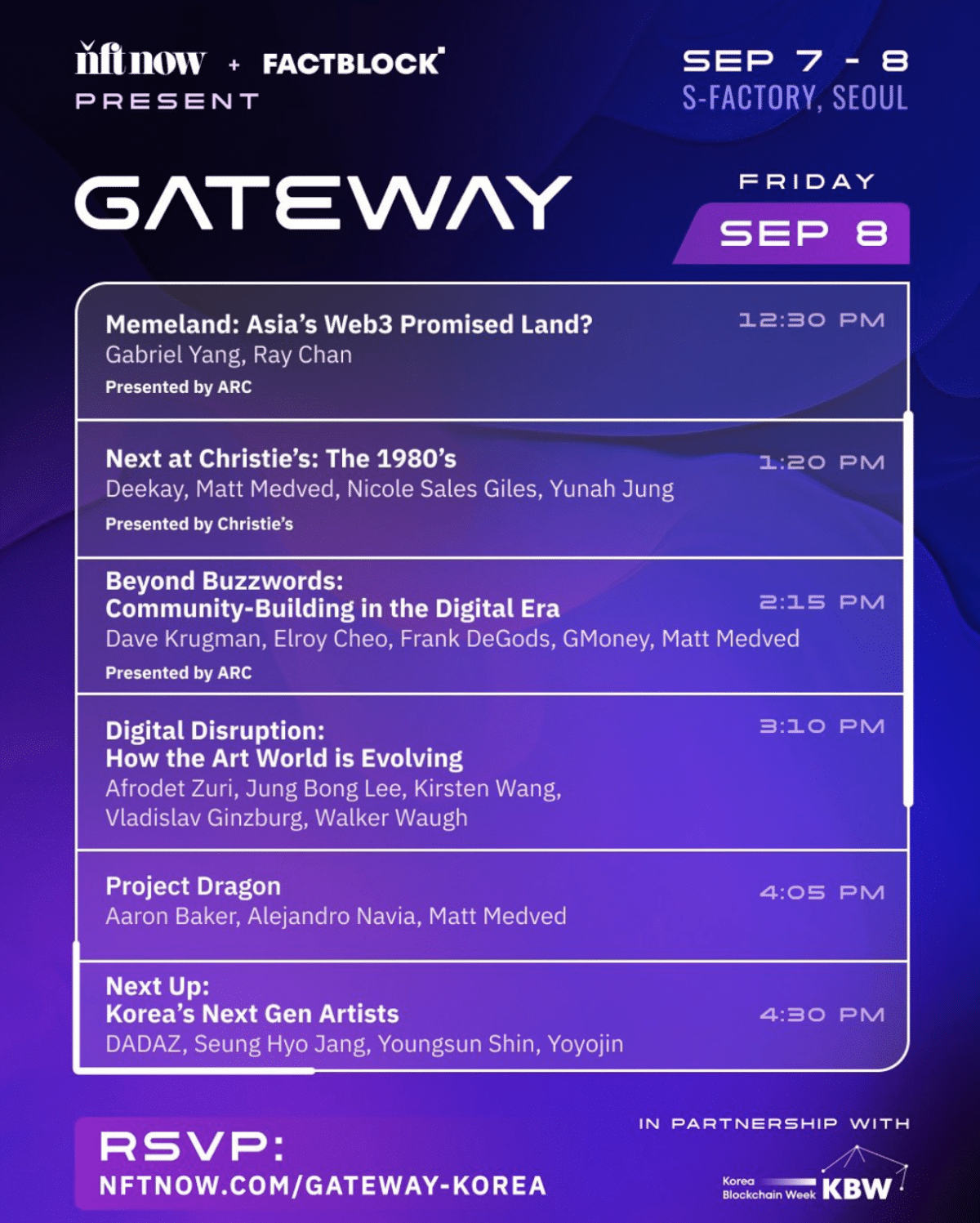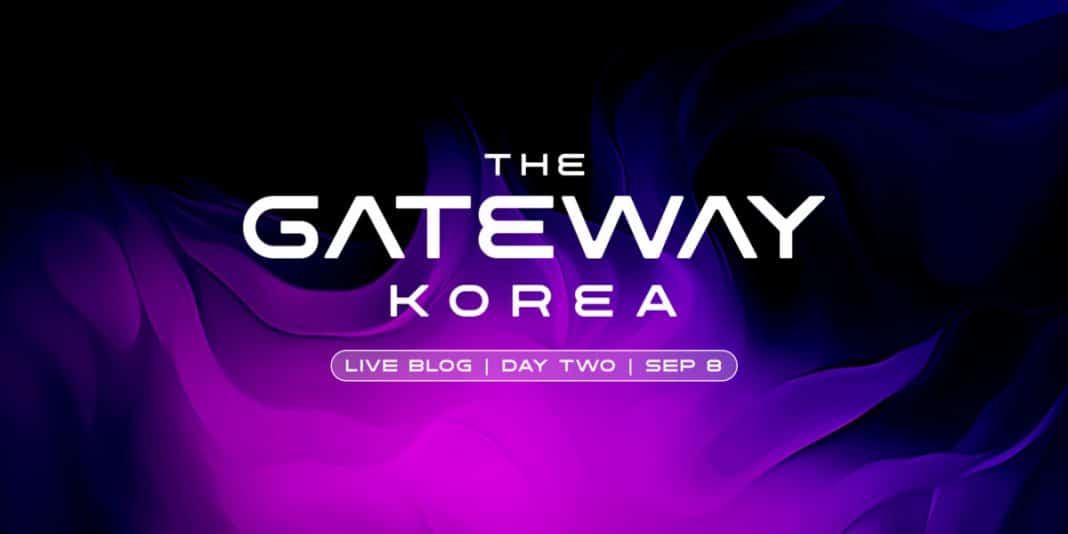In the heart of Seoul’s art scene, the doors to The Gateway: Korea have opened. Attendees, speakers, art enthusiasts, critics, and creators gather with a shared enthusiasm for art and innovation. Whether you are unable to attend the event or are seeking a comprehensive overview, check back to this live blog for up-to-date summaries, panel recaps, and behind-the-scenes insights from Day Two. You can view the Day One recap here.
Here’s our speaker programming schedule for the day:

11:25 a.m.: We find ourselves now on the second day of The Gateway: Korea. The inaugural day of programming (yesterday) proved to be a success. What’s particularly fascinating to me is the diverse mix of attendees hailing from both the East and the West. It’s worth noting that a significant portion of the attendees are Korean residents who are experiencing The Gateway for the very first time.
My co-workers and I have observed a few cultural differences during the panels and talks. Notably, Korean audiences tend to exhibit a distinct manner of attentiveness. Unlike the enthusiastic cheers and small talk often heard in American audiences, Korean attendees are generally quieter audience members. However, it’s important to stress that neither approach is inherently superior to the other. An audience’s volume doesn’t necessarily correlate with its level of interest. In fact, many attendees, regardless of their nationality, seem engrossed in the subject matter, dedicating a significant portion of their time to taking notes during the talks. I’m especially excited about the Christie’s panel and Community-Building panel. Keep checking back for more updates.
12:45 p.m.: The panel started with Gabe Yang introducing ARC Community and his friend Ray Chan, also known as 9GAGCEO. They talk about Asia as the Web3 promised land. Chan says it’s not just a Web3 trend but a general trend. Chan says the beautiful thing about Web3 is that people don’t care where you’re from behind the dark PFP. It’s very gender-neutral, country-neutral. “When there’s a fair ground, you know that Asia is good at this,” Chan said.
1:01 p.m.: Chan says there is a perception that Asians work harder than other races. He says they’re the ones who stay late at work and work and study hardest in school. However, he adds that working smart is equally important as working hard. He says there are a lot of things to learn that can’t be learned in school.
1:03 p.m.: Will Asia lead the next bull market? Yang poses this question to Chan but says himself that he doesn’t think it’s just Asia. Chan laughs and says, “Asia led the last bull. 70% of the miners are there. Asia has led crypto since the beginning.”
1:07 p.m.: Chan says he has decentralized his Memeland team and that his company is 100% remote. He does not have an office.
1:10 p.m.: Chan and Yang discuss remote work— its advantages and disadvantages. Chan says it’s about finding your own way and that no way is better than the other.
1:11 p.m.: “When most companies complain about remote work lowering productivity, they have a fantasy of high productivity at work. I remember when I worked in the office, I was browsing websites,” Chan said.
1:14 p.m.: Chan says he wants everyone to win. He says he doesn’t want to beat other projects.
1:33 p.m.: Matt Medved introduces the panelists and the exclusive Keith Haring piece premiering at The Gateway: Korea. He asks the panelists about Haring and what his impact has been on their style.
1:41 p.m.: DeeKay says Keith Haring broke the boundaries between high art and low art. He says that’s exactly what he wants to do as an artist. “I feel like I’m continuing his legacy through my art. I think if he were alive today, he would have adapted perfectly to blockchain technology. I think we would’ve gotten along.”
1:44 p.m.: Nicole Sales Giles adds that Haring’s motto was, “Art is for everyone.” She says that’s what they’re trying to do at Christie’s by bridging the gap between the traditional and new art space.
1:50 p.m.: “Digital art is so embedded in me,” DeeKay said. “When you have fun, you keep doing it without even thinking about it.”
1:52 p.m.: Yunah Jung talks about the growing influence of the Asian market, especially in Korea and Hong Kong. She says the highest price anyone has ever paid for a Keith Haring piece is $6 million. That is the highest auction record.
2:03 p.m.: DeeKay talks about how we all have different backgrounds and lifestyles, but through art, we are all connected. He said he didn’t get that in his old corporate job. There was no connection like it was in Web3. “I get to build relationships and connect with other artists and be part of the community. It’s such an amazing feeling.” He talks about his solo exhibition happening now in Seoul.
2:12 p.m.: Nicole Giles concludes the panel with more on what Christie’s is doing with artists. She says it’s quite rare for artists to sell original work through an auction house.
2:20 p.m.: Beyond Buzzwords: Community-Building in the Digital Era begins with Elroy Cheo of ARC Community, Frank DeGods, Gmoney, Matt Medved, and Dave Krugman of ALLSHIPS.
2:37 p.m.: “If you launch an NFT project, you have to be ALL IN.” gmoney says, citing the stresses of being a founder and how it’s a 24/7 commitment.
2:42 p.m.: “I’d rather have 10 thousand collectors than 10 million followers.” Dave Krugman talks about holders as active community vs. just followers as passive community.
2:46 p.m.: Medved mentions that one of the struggles of being a community founder is backlash. He asks how Frank navigated the DeGods Season III backlash. Frank says it’s about putting a product out, listening to the feedback/community, and making a change/decision. He adds that you can’t listen to every opinion. He says other opinions can help color your opinion, but you have to make your own decision.
2:52 p.m.: Elroy Cheo talks about ARC Community and how it currently dominates Singapore but is planning on expanding to other parts of Asia.
2:56 p.m.: Frank DeGods says people are focusing too much on onboarding instead of serving the current community members in Web3.
3:08 p.m.: Panelists wrap up the panel with a long discussion on royalties, what it means to them, and how it affects the way they see their holders.
3:20 p.m.: Panel of leaders in the fine art industry discuss how digital art and how the art world is evolving.










